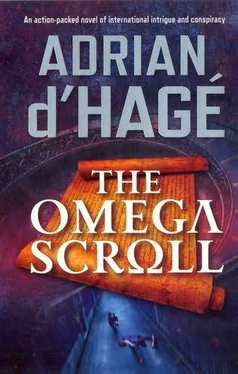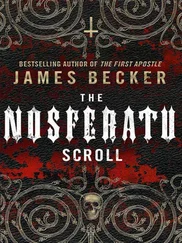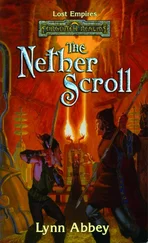Adrian D'Hage - The Omega scroll
Здесь есть возможность читать онлайн «Adrian D'Hage - The Omega scroll» весь текст электронной книги совершенно бесплатно (целиком полную версию без сокращений). В некоторых случаях можно слушать аудио, скачать через торрент в формате fb2 и присутствует краткое содержание. Жанр: Политический детектив, на английском языке. Описание произведения, (предисловие) а так же отзывы посетителей доступны на портале библиотеки ЛибКат.
- Название:The Omega scroll
- Автор:
- Жанр:
- Год:неизвестен
- ISBN:нет данных
- Рейтинг книги:3 / 5. Голосов: 1
-
Избранное:Добавить в избранное
- Отзывы:
-
Ваша оценка:
- 60
- 1
- 2
- 3
- 4
- 5
The Omega scroll: краткое содержание, описание и аннотация
Предлагаем к чтению аннотацию, описание, краткое содержание или предисловие (зависит от того, что написал сам автор книги «The Omega scroll»). Если вы не нашли необходимую информацию о книге — напишите в комментариях, мы постараемся отыскать её.
The Omega scroll — читать онлайн бесплатно полную книгу (весь текст) целиком
Ниже представлен текст книги, разбитый по страницам. Система сохранения места последней прочитанной страницы, позволяет с удобством читать онлайн бесплатно книгу «The Omega scroll», без необходимости каждый раз заново искать на чём Вы остановились. Поставьте закладку, и сможете в любой момент перейти на страницу, на которой закончили чтение.
Интервал:
Закладка:
Jerusalem
‘David! That’s outrageous. It’s got that arsehole Petroni written all over it!’
It was a side of Allegra that David did not see very often. She had even picked up some of David’s more colourful expressions.
‘Announcing that just before they go into the conclave is deliberate.’
‘I think you’re right,’ David agreed, ‘but I’m not sure there’s much we can do about it.’
Allegra shook her head defiantly. Her eyes flashing angrily, she picked up the phone and dialled Patrick O’Hara’s number. It was Sister Katherine who answered the phone.
‘Thank you, Sister Katherine, I’ll be there at half past eight,’ she said, a look of frustration on her face.
‘Patrick’s in Bethlehem for the night, but I’ll go round in the morning. It will be too late though,’ she said resignedly. ‘The conclave starts tomorrow. That bastard Petroni has timed this to the minute.’
Tom Schweiker roused himself from a deep sleep and reached for his mobile but it rang out before he had a chance to answer. It rang again. Whoever that is wants to speak to me now, he thought with a touch of irritation. Daniel Kirkpatrick probably. Tom had decided long ago that even if Ferret Face could have absorbed the detail he had more than likely been absent from the geography lesson that dealt with time zones.
‘Schweiker,’ he answered, without looking at the number on the screen.
‘Sorry to bother you, Mr Schweiker, but I thought you should hear this as soon as possible.’
Tom sat up, trying to place the voice. ‘Who is this?’
‘My name is Hank Petersen, Mr Schweiker. Before he was killed my friend Mike McKinnon sent me an unusual parcel. The prints on the whisky glass were excellent, and I thought you might like to know they match those of a Father Rory Courtney. He did time in Montana for assault back in the late 1950s. His file is also flagged with a number of suspected paedophilia offences. No charges were ever laid, although the Catholic Church carried out an internal investigation that was handled by a Bishop Petroni in the Vatican. Courtney disappeared shortly afterwards. I’m not sure if that’s any help, but if you were a friend of Mike’s, it’s the least I could do. If you’re ever in Washington, look me up.’
‘I’m much obliged, and I’ll certainly do that.’
‘Bastards!’ Tom Schweiker swore angrily after he’d switched off his phone, his suspicions about the scar confirmed. Bishop Petroni was now Cardinal Petroni and Secretary of State, he thought bitterly. He looked at his watch – 2 a.m. Patrick O’Hara was probably the only person he could trust. He decided to ring him the next morning.
CHAPTER FIFTY-TWO
Roma
A t the end of the Mass the lilting sopranos rose over the baritones in the choir as the haunting strains of Giovanni Pierluigi da Palestrina’s ‘Tu es Petrus – Thou art Peter’ echoed around the vast Basilica of St Peter’s and the 115 cardinals who had made it to Rome to elect the successor to John Paul II filed two by two into the Sistine Chapel that would soon be sealed off from the outside world. The special chimney was in place, as was the antiquated stove where the ballots would be burned, together with the chemical candles to colour the smoke. Black would indicate that no candidate had received the two-thirds plus one majority that was required for election. White would indicate that a candidate had reached the critical figure of seventy-eight votes.
Under Michelangelo’s fresco of creation, six rows of desks and chairs stood in three rows on either side of the chapel. At one end near the altar, desks had been placed for the scrutineers and vote counters.
‘ Extra omnes,’ the Camerlengo ordered in Latin. It was the order for all those who were assigned duties as assistants, including the two medical practitioners, to vacate the Sistine Chapel, although they would not be allowed to go any further than the Santa Marta Hospice. In accordance with protocol the Heads of Vatican departments, including Petroni, had all been suspended from their duties, except for five men: the Camerlengo, the Cardinal Vicar of Rome, the Major Penitentiary, the Cardinal Arch-priest of St Peter’s and the Vicar General for the Vatican City State.
Giovanni took his seat in the second row on the right. He had been intrigued to find he was under investigation but not really surprised. It would not be the first time the Holy Church had reacted fiercely against anyone who questioned the fallibility of the doctrine. On each desk there was a copy of Universi Dominici Gregis – The Whole Flock of the Lord, Pope John Paul’s revised rules for the election of his successor.
Giovanni looked around. Cardinal Thuku from Kenya flashed him a broad smile, as did Giovanni’s preferred candidate, Cardinal Medici of Ecuador. Giovanni hoped for the sake of the Church that the election would be a short one, but if it went for two or three days, it would at least give him a chance to catch up with so many of his friends.
The Camerlengo, Cardinal Monetti, a short, bald, slightly built man, held up his hand for silence. ‘Let us pray,’ Cardinal Monetti began: Almighty God, we your servants ask for your guidance as we gather together in your name. Grant us wisdom as we deliberate on whom amongst us is to assume the awesome responsibilities as the successor to Peter, on whose rock your Holy Church has been founded, through Christ our Lord, Amen.
‘Amen,’ Giovanni joined the chorus of his colleagues.
‘I will remind you again, Eminences,’ the Camerlengo intoned, ‘of the oath you have sworn to follow the rules of this election, to observe with the greatest fidelity the secrecy regarding everything that relates to the election of the Roman Pontiff and what occurs in this place of election, and if you are elected, to defend the rights of the Holy See.’
Six cardinals had been elected to assist the Camerlengo in the conduct of the election – three cardinal ‘scrutineers’ and three cardinal ‘revisers’ tasked with scrutineering the scrutineers – and the Camerlengo nodded to them as a sign for the ballot papers to be distributed.
Giovanni smiled his thanks as he took the small rectangular slip of paper inscribed with the Latin words, ‘ Eligo in summum pontificem ’ – ‘I elect as Supreme Pontiff’. Obeying the quaint instruction to disguise his handwriting, he inscribed his ballot with the name of Cardinal Rodriguez Medici and folded it. He took his turn to file up to the altar holding the ballot above his head.
Giovanni placed his ballot on the paten covering the chalice and knelt at the altar, praying silently for the Holy Spirit’s presence, and as he rose he said, ‘I call to witness Christ the Lord who will be my judge, that my vote is given to the one before God I consider should be elected,’ and then using the paten he dropped his ballot into the chalice.
When all the votes had been cast the first scrutineer covered the chalice with the paten and shook it to mix the ballots, and when the scrutineers, checked by the revisers, had satisfied themselves that there were only 115 ballots in the chalice, the vote counting began.
The first cardinal scrutineer noted the name on the first ballot and passed it to the second scrutineer who did the same. The third cardinal scrutineer read the name out loud for the whole college to note.
‘Cardinal Lorenzo Petroni,’ the third cardinal scrutineer intoned, and he pierced the card through the word ‘ Eligo ’ and placed it on a thread that would join the votes together to be burned or, if a Pope was elected, kept for his retention.
‘Cardinal Giovanni Donelli.’
Giovanni shook his head but smiled. It didn’t hurt to get one or two votes he supposed.
Читать дальшеИнтервал:
Закладка:
Похожие книги на «The Omega scroll»
Представляем Вашему вниманию похожие книги на «The Omega scroll» списком для выбора. Мы отобрали схожую по названию и смыслу литературу в надежде предоставить читателям больше вариантов отыскать новые, интересные, ещё непрочитанные произведения.
Обсуждение, отзывы о книге «The Omega scroll» и просто собственные мнения читателей. Оставьте ваши комментарии, напишите, что Вы думаете о произведении, его смысле или главных героях. Укажите что конкретно понравилось, а что нет, и почему Вы так считаете.











